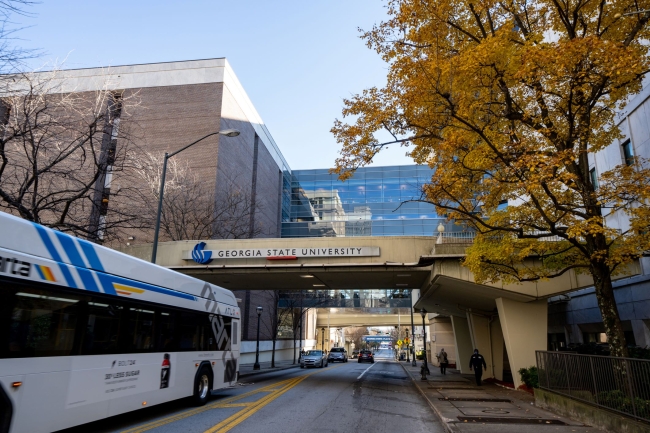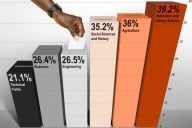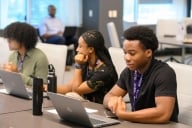You have /5 articles left.
Sign up for a free account or log in.

Business students at Georgia State can participate in a four-semester fellowship program that teaches them research principles and culminates in an individual research project.
felixmizioznikov/iStock Editorial/Getty Images Plus
Across all the programs of study in higher education, business has been the most popular major among bachelor’s degree recipients for the past decade. In the 2021–22 academic year, business majors made up 19 percent of all U.S. degrees conferred, with around 375,400 graduates studying business, according to data from the National Center for Education Statistics.
Within the industry, business students have numerous career opportunities available, which can present a challenge to students unsure of where they’d like to apply their studies. A new initiative at Georgia State University’s Robinson College of Business emphasizes the field of business research, exposing students to various career paths through experiential learning.
The Undergraduate Business Research Experience (UBRE) supports a cohort of students for four semesters as they learn research inquiry and professional development, culminating in an independent research project presented to the university community.
The background: The program was born from two desires: to showcase the excellent research being done by faculty and to introduce students to a mostly unfamiliar career path, says Jen Bailey, associate dean for undergraduate programs at Robinson College.
“As I think about our students as the next generation of leaders and innovators, I want to make sure that this concept of thought leadership is also something that we’re preparing them to do,” Bailey says. “Preparing them to lead, not just existing organizations, but to challenge organizations and the status quo about how businesses operate and how businesses run, and that’s what research is all about.”
How it works: To be eligible, applicants must be undergraduate students studying business and hold at least a 3.0 GPA. Students of any grade level are able to participate.
“What I was looking for was somebody who was intellectually curious,” Bailey says. “The student who, as a kindergartner, was probably asking their mom, ‘Why? Why does it happen? Why?’ Putting that curiosity to good use.”
The fellowship is centered around the creation and execution of an individual research project in three stages: learn, explore and share. Students commit to participating for at least five hours a week and earn $15 an hour.
In the first term, participants meet weekly as a group for two hours every Friday and attend a research event on their own. During the initial few months, students learn about research question development, how to read a business research article and current industry problems to be addressed. Students are also introduced to graduate programs and the research currently being done at Robinson College.
“The students are here for classes, probably not thinking about research, and I often tell them that they’re sitting on a gold mine,” Bailey says. Some of the weekly sessions would include a panel of researchers to talk about why they chose a graduate career and how they selected their research topic.
Over the summer and fall, students develop their research question, supported by a faculty mentor. Bailey put out a call for faculty mentors when the program launched, gathering a team of researchers who could support students’ work.
“They’re going to have to manage their mentor—this not a shadowing. This is ‘I need to get somewhere, and I needed [them] to help me to get there,’” Bailey says. “That’s a skill, of advocacy for yourself and asking the right questions and asking for support.”
Fellows will spend their final semester implementing their projects and presenting their work at the Georgia State Undergraduate Research Conference, which takes place annually in April.
“[The conference], as you might can imagine, is heavily populated by the life sciences and the more traditional research careers,” Baily says. “So we want to have our space in that conversation, too.”
The impact: Bailey wasn’t confident a program like this would garner student interest but was quickly surprised. UBRE received 250 applications in the first cycle, and staff selected 40 fellows for the inaugural cohort.
“Don’t underestimate the students,” Bailey says. “Even as I’m saying, ‘I want to unleash their full potential,’ I still had a set of assumptions about who they were and what they might be interested in, and I think that was my biggest takeaway. The sky’s the limit for these students. Don’t underestimate them. Challenge them and rise to the challenge.”
Bailey’s first goal of exposing students to business research was easily accomplished, with many participants sharing they weren’t aware of the career opportunities in research as business students.
What’s next: In the short term, Bailey hopes to see students produce successful research projects and develop personal and professional skills. More long term, the goal is for students to consider graduate education to continue their research futures.
“Research is such a fundamental problem-solving approach, and so, regardless, they will have left the program with this idea of, ‘What is the underlying assumptions and theories behind what I expect to happen?’” Bailey says. “I think they’re going to leave with a lot of transferable skills and a sense of a lot of other possibilities that they may not have considered.”
The next cohort of learners will join in January 2025.
If your student success program has a unique feature or twist, we’d like to know about it. Click here to submit.








